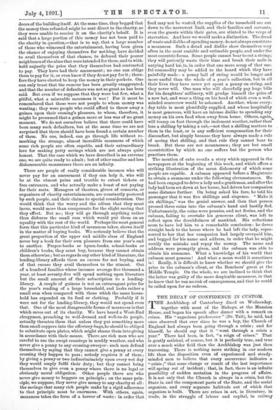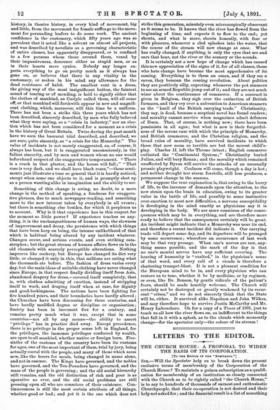THE DECAY OF CONFIDENCE IN CUSTOM.
THE Archbishop of Canterbury dined on Wednesday, together with most of the Bishops, at the Mansion House, and began his speech after dinner with a remark on crises. His " sagacious predecessor " (Dr. Tait), he said, bad once observed that ever since he was a boy, the Church of England had always been going through a crisis ; and for himself, he should say that it " went through a crisis a year." There had been, in fact, "a reign of crises." That is gently satirical, of course, but it is perfectly true, and true over a much wider field than the Archbishop was just then traversing. There is nothing more striking in our modern life than the disposition even of experienced and steady- minded men to believe that every occurrence indicates a " crisis ;" that some change or result of the last importance will spring out of incident ; that, in fact, there is an infinite possibility of sudden mutation in the progress of affairs. It is not only that the Church is always in a crisis, but the State is, and the component parts of the State, and the social organism, and every separate habitude out of which that organism is built. There are crises in art, in literature, in trade, in the straggle of labour and capital, in railway
history, in theatre history, in every kind of movement, big and little, from the movement for female suffrage to the move- ment for persuading loafers to do some work. The ancient confidence in the customary, which fifty years ago was so prevalent that it acted like a solvent on almost all projects, and was described by novelists as a governing characteristic of entire classes, has apparently disappeared, or is confined to a few persons whom those around them, vexed by their impassiveness, denounce either as stupid men, or as in their hearts mere cynics. Nobody any longer ex- pects everything to go on pretty much as it always has gone on, or believes that there is any vitality in the customary, or makes in his mind any allowance for the dead resistance of habit. The smallest rent in a dress, the giving way of the most insignificant button, the faintest sound of tearing or of mending, is held to signify either that the clothes of mankind, as Carlyle called them, will all come off, or that mankind will forthwith appear in new and magnifi- cent clothing, which, moreover, will this time be a uniform. There has not been a strike this three years which has not been described, sincerely described, by men who fully believed what they were saying, as a " crisis in industry," nor an elec- tion which has not been considered for a moment as a crisis in the history of Great Britain. Twice during the past month have we seen the baccarat trial described, and described, we are sure, quite sincerely, as " a crisis for the Monarchy." The value of incidents is not merely exaggerated, as, of course, it always has been, but it is exaggerated unconsciously, in the fullest sincerity, and by men and women whom no one would beforehand suspect of the exaggerative temperament. " There is a crack in that plaster, and the house will fall;" " That rose is very dark, and we shall have black roses,"—these senti- ments just illustrate a tone so general that it is hardly noticed, except when some one objects to it, and is promptly shut up as a person wanting alike in imagination and the ability to see• Something of this change is owing, no doubt, to a mere change in the method of speaking, a fondness for exaggera- tive phrases, due to much newspaper-reading, and something more to the new interest taken by everybody in all events ; but there is something else besides, for which it perplexes us to account. Why is it that experience has in this respect for the moment so little power P If experience teaches us any- thing, it is the unchangeableness of human ways, the slowness of improvement and decay, the persistence with which things that have been keep on being, the intense unlikelihood of that which is habitual being altered by any incident whatever. Changes occur, and serious events, and even striking cata- strophes ; but the great stream of human affairs flows on in the old channels with scarcely perceptible alterations. Nothing improves like cookery, but Europe has changed its diet very little, or changed it only in this, that millions are eating what the thousands ate before. The fashion of dress varies every day, but the main ideas of suitable clothing have never changed since Europe, in that respect finally dividing itself from Asia, abandoned drapery for dress,—covered itself completely, that is, with clothes admitting of exertion, instead of stripping itself to work, and draping itself when at ease, for dignity and good-lookingness. The nations have been fighting for five hundred years, and their boundaries have hardly altered ; the Churches have been discussing for three centuries, and have hardly modified dogma or discipline or organisation ; Society has been in incessant flux for a century, and remains pretty much what it was, except that in some countries—not all by any means—the ability to assert " privilege " has in practice died away. Except precedence, there is no privilege in the proper sense left in England, for the privileges, the immense privileges conferred by wealth, are open to all mankind, whether native or foreign born. Five- sixths of the customs of the country have been its customs for ages, one of the most important of them, trial by jury, being actually coeval with the people, and many of those which seem new, like the hours for meals, being changed in name alone, and not in essence. The Kings have governed, and the nobles have governed, and the Ten-Pounders have governed, and the mass of the people is governing ; and the old social hierarchy still remains, and the old distinction of rich and poor is as operative as ever, and the old social problems are still pressing upon all who are conscious of their existence. Con- tinuousness is still the most certain attribute of all things, whether good or bad ; and yet it is the one which does not strike this generation, minutely even microscopically observant as it seems to be. It knows that the river has flowed from the beginning of time, and expects it to flow to the end; yet shouts, and what is more, shouts honestly, with fear or with pleasure, whenever a clod splashes into the water, that the course of the stream will now change at once. What has really changed, if anything, is only the eyes that see and ears that hear, not the river or the scenery or the sounds.
It is certainly not a new hope of change which has caused this new appreciation of the signs of it, for of all classes, those who hate change have become the most apprehensive of its coming. Everything is to them an omen, and if they see a raven, they bemoan the coming revolution. About politics they are positively silly, expecting whenever the pot simmers to see an armed Republic jump out of it; and they are not much wiser about the continuance of commerce. If a contract is given in Belgium, they sigh over the extinction of British furnaces, and they cry over a subvention to American steamers as the " knell of the British carrying trade." Christianity, they say, is dead, because a sceptical novel has found readers; and morality cannot survive when magazines admit defences of Ibsen. That, of course, is nothing new; there have been pessimists in all ages ; but what is new is their forgetful- ness of the serene ease with which the principle of Monarchy, and British commerce, and the Christian religion, and the broad rules of morality, have survived incidents to which those that now seem so terrible are but the merest child's- play. Charles 1L left the Throne intact; English commerce outlasted the "Continental System;" Christianity buried Julian, and will bury Renan; and the morality which remained unaffected by Byron will survive the attacks of an unusually prosaic playwright. Coolness will come, though a day is hot; and neither drought nor storm foretells, still less produces, a permanent change in the seasons.
We suppose the true explanation is, that owing to the hurry of life, to the increase of demands upon the attention, to the new strain upon the brain in education, owing to its greater value in the battle of life, and possibly to some instinctive over-exertion to meet new difficulties, a nervous susceptibility is developing in the mind exactly as physicians say it is developing in the body. We are more conscious of the conse- quences which may be in everything, and are therefore more ready to believe that the consequences certainly will be great. An incident might indicate that a Monarchy was near its end, and therefore a recent incident did indicate it. Our carrying trade will depart some day, and its departure will be presaged by some occurrence ; wherefore an occurrence of last week may be that very presage. When one's nerves are raw, any- thing seems possible, and the mark of the day is that no one's mental nerves have any sufficient covering. The hearing of humanity is "exalted," in the physician's sense of that word, and every call of a cicada is therefore a shattering trumpet-blast. It is not a pleasant condition for the European mind to be in, and every physician who can restore us to tone, whether it be by medicine, or by regimen, or even, like Dr. Benson, by gentle ridicule of the patient's fears, should be made heartily welcome. The Church will certainly not be destroyed or greatly weakened by its recur- rent " crises," and we do not sincerely think that the State will be, either. It survived alike Napoleon and John Wilkes, and may therefore hope to survive Justin McCarthy and Mr. Henry Labouchere. Oh for a copy of a Times of 1991, just to teach us all how the river flows on, as indifferent to the things that fall in it with a splash, as to the clouds which momently change—for the spectator only—the colour of its stream !











































 Previous page
Previous page